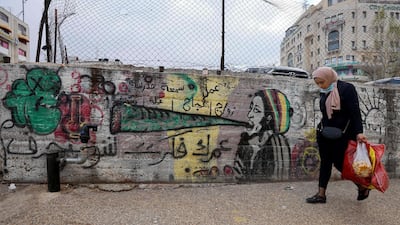The World Bank approved a new four-year strategy for Palestine that is focused on protecting lives and creating jobs amid the Covid-19 pandemic.
“Due to the persisting fragile context, exacerbated by the Covid-19 pandemic, resilience strengthening is needed immediately,” said Kanthan Shankar, World Bank country director for West Bank and Gaza, on Thursday.
"The new World Bank strategy will act to protect lives and livelihoods and put the jobs agenda at the forefront of its strategy."
Palestine’s economy shrunk by 11.5 per cent last year, one of the sharpest contractions on record, and only a modest recovery is expected this year as its overwhelmed healthcare sector struggles to deal with new infections.
The Washington-based lender said earlier this year that it expects the economy to grow by 3.5 per cent in 2021 after social-distancing measures affected the growth of the tourism and construction sectors, as well as parts of the service industry such as restaurants.
The measures also dented the prospects of workers who depend on jobs in Israel..
The World Bank said the government’s fiscal deficit of more than $1 billion, which is at its highest point in years, and declining government revenue will “depress investment and squeeze out urgent spending.”
“The programme will continue to strengthen Palestinian resilience in times of crisis and provide relief and recovery, including through emergency social protection and cash-for-work programmes,” it said.
“The social response will aim to enhance workforce resilience and capability for better employment through improving the quality of education and health. It will increase its support to small and medium enterprises and start-ups for job retention and business
continuity.”
The strategy will help champion a “well-connected Palestine” to become more integrated into global markets and develop trade in the region, especially in the energy sector.
It also aims to strengthen the financial sustainability of local government units and their capacity to deliver services.
“More than 36 per cent of youth are unemployed in the Palestinian territories, particularly high in Gaza with 66 per cent and as high as 91 per cent for women,” said Mr Shankar.
“The new strategy sees the digital economy as a means of securing significant economic opportunities for young people and leading to a more engaged society.”
The World Bank granted an additional $9 million to Palestine's Innovative Private Sector Development Project in March to support start-ups and SMEs through financial and technical assistance.
It also approved a grant of $20m to improve access to high-speed broadband services in Palestinian territories in the same month.


